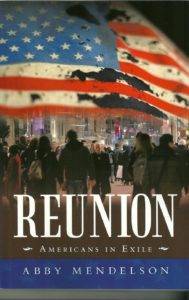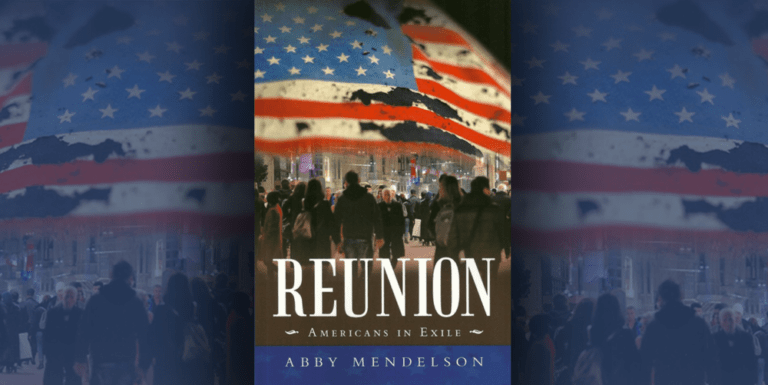Note from the Author: All proceeds from the sale of Reunion: Americans in Exile will go to the Greater Pittsburgh Community Food Bank!
From the Publisher: “From the award-winning author of Paradise Boys, Scotch and Oranges, Ghost Dancer, End of the Road, and The Oakland Quartet comes Reunion, a striking new collection of 16 stories. Subtitled Americans in Exile, Reunion chronicles the lives of Americans torn from their places and their pasts. Set in a wide variety of locales – England to Hawaii, Venice to Vietnam, Park Slope to Prague, Block Island to Hoonah, Alaska – the stories go where Americans find themselves searching for connection, coping with aging and loss. Military men and missing persons, foreign service officers and fashion models, friends and lovers, grief groups and high-school reunions, Reunion presents a stunning series of portraits of characters and concerns, living and dying, present and past. People wrestling with the concerns of age and of our age. People living on edges, seeking to return, yearning for reunion.”
About the Author: “Abby Mendelson is the author of three novels, Paradise Boys, Scotch and Oranges, and The Oakland Quartet, and two short-story collections, Ghost Dancer and End of the Road. His most recent book, Spirit to Spirit: A Portrait of Pittsburgh Jazz in the New Century, chronicles Pittsburgh’s rich jazz life. In addition, he wrote the number-one bestselling The Pittsburgh Steelers Official History, in a fourth, revised edition; The Pittsburgh Steelers: Yesterday and Today; and The Steelers Experience.
Also about Pittsburgh are his Arena: Remembering the Igloo; Pittsburgh: A Place in Time, about Pittsburgh neighborhoods, in a second, revised edition; Pittsburgh Prays: Thirty-Six Houses of Worship; Voices from the Hill: A Celebration of Hill House; Reckoning with Rainbows: The History of The Pressley Ridge Schools; and A Century of Caring: The History of Holy Family Institute. For Pittsburgh Born, Pittsburgh Bred, the official 250th Pittsburgh anniversary book, he contributed more than 200 profiles of notable Pittsburghers.
As an editor, he has handled a variety of complex projects, including various histories and biographies, Countdown to Renaissance II, the first study of the 1970s Pittsburgh urban revitalization, and Wilderness Within, Wilderness Without, about the lives of troubled teens in a treatment center. Having written countless newspaper and magazine articles on a wide variety of subjects, he also authored by-lines pieces for Pittsburgh: Fulfilling Its Destiny, Pittsburgh Characters, and The Power of Pittsburgh. As part of a 50-year pedagogic career, he teaches literature and writing at Chatham University, Point Park University, and the University of Pittsburgh Osher Program. He holds a Ph.D. in English from the University of Pittsburgh and lives in Pittsburgh with his wife Judy.”
From “Armistice Day,” the first of 16 stories in Reunion
 No, no, no, no. No notes. No tape recordings, either. You’re not wired, are you? No? Good. I don’t want to be a part of this. I don’t want my name appearing anywhere. This is just two guys talking. Soldier talk. I want you to know about Harry Burns. James Harris Burns, III. Remarkable man, simply remarkable. Great solider, deep thinker. Great insights into America — American foreign policy, American imperialism, American history. As brittle as he was brilliant. Contrary to a fault. Difficult. Died a few weeks ago. Sad story. Tough story.
No, no, no, no. No notes. No tape recordings, either. You’re not wired, are you? No? Good. I don’t want to be a part of this. I don’t want my name appearing anywhere. This is just two guys talking. Soldier talk. I want you to know about Harry Burns. James Harris Burns, III. Remarkable man, simply remarkable. Great solider, deep thinker. Great insights into America — American foreign policy, American imperialism, American history. As brittle as he was brilliant. Contrary to a fault. Difficult. Died a few weeks ago. Sad story. Tough story.
He’s evanescent now. Will-of-the-wisp. In time, he’ll entirely disappear. I didn’t want that for him. I want someone to know what he was about.
What Vietnam was about.
Especially with Harry Burns and Les Six and the Black Flag Battalion and all of it.
In telling it, the story defies linearity, although I’ll try. I’ll try to piece it together, make it a kind of pastiche. A mosaic that will illustrate his character. And the soldier talk of survivors. And the armistice that followed.
Harry Burns might have pulled easy duty. A lot of guys did. But he, and a bunch of other Ohioans, were put in the Black Flag Battalion. From there we were siphoned off into six-man squads sent out to do — whatever was necessary. Whatever they wanted to keep off the books.
Our squad — tagged Les Six by the Frenchies who were still hanging around after their army pulled out — was an odd lot of guys. Armies are made that way. Men — boys, really — thrown together, finding themselves in harm’s way, having to depend on each other to survive. To do extraordinary things. To do unspeakable things. Things they can never talk about except to one and other.
Nobody else wants to hear what happened. They say they do, but they don’t.
Even if they’re told, they won’t understand.
They’re civilians.
You weren’t followed coming here, were you? You’re sure? Good.
You like the place? Atlasta Lodge. It’s my uncle’s. Built the entire thing himself, circa 1940, with his own two hands. Oh, he had a little help with the plumbing and the electric — needed registered guys for the permits and all — but he did everything else, and I mean everything else, by himself. Cut all the logs from nearby forests. Cured the wood. Hung the windows. Laid the floors. Stained the walls. Even made the furniture. All local wood. Made the stone fireplace, too.
I inherited it. He had no kids, and none of my cousins or siblings were interested. My wife and kids don’t come here, either. Too Spartan. Too remote. Hell, that’s perfect for me. It’s the place I get away to. Right, generally alone. Don’t get me wrong: Ashtabula’s a nice quiet place. Ohio, in general, is a lot more quiet than you’d think. Midwest. Friendly. Everybody minds their own business.
But sometimes the Neal Family Farm, with all its demands, can be overwhelming. All those triggers. So I come here. Generally alone.
Only exception has been Les Six. Brought them here when I thought we needed it. No way we could be overheard. No, never any families. Never any civilians. Weekends devoted strictly to soldier talk. To exorcise the demons. Or try to, anyway.
No, don’t worry about what you hear on the roof. Not rats. Squirrels. They’re fine. We’re friends.
He was a Neal, my father’s brother. I was named after him, Alvin C. Neal. But don’t use that. Don’t. Don’t. Every so often I Google myself — just to see that I’m not there. Suits me fine to be invisible. It’s jungle warfare. Leave no trace. If they can’t track you, they can’t hurt you.
They wanted to make me an officer, but I refused. Didn’t want to be a lieutenant, especially in the jungle. Lieutenants were stupid. Lieutenants were responsible. Lieutenants got you killed — or got themselves fragged. Grenade in the sleeping bag. I wasn’t going to go that way.
I’m no leader — no, never was. But in Vietnam I just figured out stuff faster. Not smarter — not smarter than Chadwick, certainly, who was noticeably smart. Not smarter than Harry Burns, who really understood history and politics. But quicker. Instinctive grasp of the situation. Bishop called it precognition, but I don’t know about that. All I know is that I’d get a feeling about what was going to happen. Then figure out a way to deal with it. Kept us alive.
Funny, I never had that before or since. I’m a dairy farmer. I deal with the down and dirty: feed, farmhands, foot rot. Milk and manure. Details. The trees. Harry Burns saw the forest. He could have been a congressman. A judge. But Vietnam scarred him. Scarred all of us.
War will do that for you, Bishop said.
Having your life in danger, Reed Murphy said, will turn your fuckin’ head around.
It was Harry Burns who tagged me Doc Neal because, he said, I could diagnose a war party like a doctor does a patient. Also, he said, because you’re something with a knife. Well, sure. Sometimes you want to get by without firing a shot. I was good at that. All that Ohio farm training, field dressing deer, skinning rabbits, gutting fish.
Worked well in the jungle.
Now this is not a war story, an in country story, and don’t tell it that way. But I think we have to start there. Because there are things that hang in the air for decades. For lifetimes, really. Paradigmatic moments from which everything seems to flow.
Of a thousand — ten thousand maybe — moments in country, one stands out as the lens through which you can see all our time there. And through which you can begin to understand Harry Burns. Tall, aristocratic, a leader. He should have been an officer, but he refused it, too. Saw too many parts of the puzzle, the good and the bad all at once. Clouded his judgment for details.
Despite his willingness to argue, to insist that he was right, he nevertheless made you feel he had your best interests at heart. Understood you. Made you feel you were the most important person in the world.
To jump ahead, it tells you everything about Vietnam, and our time there, that he came home and instead of doing something important, he spent the next 40 years stocking shelves for the kind of main street sporting goods store that no longer exists.
Let me give you one day in country, Fire Base Bravo, north of Khe Sanh, 1968.
The sweat and stink of the jungle was like a blanket smothering us. The stench of rotting things. The smell of raw fear. Small, frightening things, muffled sounds, fleeting shadows. We learned to see what wasn’t there. To distrust the slightest flicker of light. To rely on subtleties.
From “Armistice Day,” first of 16 stories in Reunion. This excerpt is published here courtesy of the author and should not be reproduced without permission.

























